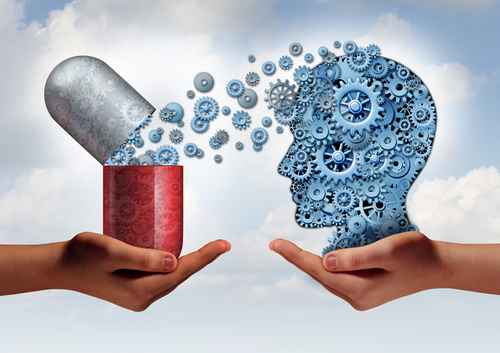Understanding the Connection Between Addiction and Eating Disorders
Substance use disorder (SUD), also known as addiction, is listed in the Diagnostic and Statistical Manual of Mental Disorders, Fifth Edition (DSM-5) as a chronic, relapsing neuropsychiatric disorder. It is characterized by the “inability to consistently abstain, impairment in behavioral control, craving, diminished recognition of significant problems with one’s behaviors and interpersonal relationships and a dysfunctional emotional response.” Studies show that drug use increases one’s risk of mental health complications. Different substances of abuse can have distinct neurotoxic and destructive effects on brain cells. Repeated and prolonged substance use that occurs with addiction can reshape the brain’s structure and how it functions. The National Institutes of Health (NIH) assert that nearly half of the people “who have a mental [health] disorder will also have a substance use disorder at some point in their lives and vice versa.” When an individual is diagnosed with both a mental health disorder, such as an eating disorder, and substance use disorder it is referred to as a dual diagnosis.
Eating Disorders
Eating disorders are defined by the American Psychiatric Association as “behavioral conditions characterized by severe and persistent disturbance in eating behaviors and associated distressing thoughts and emotions.” There are several different types and each are recognized as chronic psychological conditions listed in the DSM-5 under the Disorder Class: Feeding and Eating Disorders. The three most common eating disorders are anorexia nervosa, bulimia nervosa and binge-eating disorder (BED). The pervasive symptoms associated with any type of eating disorder can cause adverse physiological consequences and interfere with one’s ability to adequately function in daily life. According to the National Eating Disorders Association (NEDA), an estimated 30 million U.S. adults will have an eating disorder at some point in their lives.
The Connection
It is not uncommon for addiction and eating disorders to co-occur. Studies show that 50 percent of people with eating disorders also abuse drugs or alcohol. Those afflicted are five times more likely to abuse substances than the general population. Individuals who abuse drugs and/ or alcohol, similarly, are up to 11 times more likely to have eating disorders. Much like substance use disorder can adversely affect every facet of one’s life, any type of eating disorder can wreak havoc on a person’s body and mind. An individual struggling with an eating disorder, regardless of the type, is likely to experience malnourishment and/ or severe undernourishment. Akin to one’s physical response to habitual drug use, one’s brain chemistry can change because of an eating disorder. Although eating disorders and addiction are comprised of distinct characteristics, if left untreated both, individually or together, can result in significant long- and short-term consequences, and in some cases become life-threatening.
Dual Diagnosis Treatment
Specialized dual diagnosis treatment options are available for individuals diagnosed with substance use disorder and an eating disorder. All aspects of dual diagnosis treatment are designed to support an individual through the recovery process with dual foci. It is essential to address and treat one’s substance abuse issues concurrently with the treatment of his or her eating disorder throughout the entire continuum of care. The co morbid disorders contribute to one another, and treatment for one should not be prioritized over the other during any stage of one’s recovery. While eating disorders and substance use disorders are life-long conditions, with proper treatment, an individual can learn to effectively manage the symptoms associated with one’s eating disorder and remain sober.
For Information and Support
Substance abuse and addiction can be incredibly dangerous and can result in severe short and long-term consequences. If you or someone you know is suffering from substance abuse or addiction, please get help as soon as possible. The earlier you seek support, the sooner you and your loved ones can return to leading happy, healthy, and fulfilling lives. There is no reason to go through this alone, and we are here to help. Please feel free to reach out to us for further information or with any questions regarding substance abuse or addiction. We are available anytime via telephone at: 213-389-9964, or you can always email us at: info@friendlyhousela.org.



